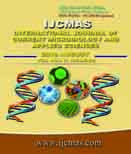


 National Academy of Agricultural Sciences (NAAS)
National Academy of Agricultural Sciences (NAAS)

|
PRINT ISSN : 2319-7692
Online ISSN : 2319-7706 Issues : 12 per year Publisher : Excellent Publishers Email : editorijcmas@gmail.com / submit@ijcmas.com Editor-in-chief: Dr.M.Prakash Index Copernicus ICV 2018: 95.39 NAAS RATING 2020: 5.38 |
An experiment was conducted with 64 weaned Soviet Chinchilla rabbits of divided in to eight treatments consisting of eight animals in each treatment to find out the effect of vitamin C, E and selenium in alone or combinations on their carcass characters during the period of heat stress. The dietary supplementation of vitamin C (T2) was given at the dose rate of (200mg per kg diet), vitamin E (T3) (40 mg per kg diet) and Selenium (T4) (0.2 mg per kg diet) and in combinations of C and E (T5) (200 and 40 mg per kg diet), C and Selenium (T6) (200 and 0.2 mg per kg diet), E and selenium (T7) (40 and 0.2 mg per kg diet) and Vitamin C, E and selenium (T8) (200, 40 and 0.2 mg per kg diet) respectively. This study was undertaken at the rabbit unit of Livestock Farm Complex, Veterinary College and Research Institute, Namakkal. Among the various supplementations vitamin C, E and selenium combinations showed the highly significantly by (P<0.01) higher weight at slaughter (2230.16 ± 59.88), carcass weight (1244.66 ± 39.25) and dressing percentage (55.80 ± 0.71) but there was no significant difference noted in the weight of foreleg (183.50 ± 0.88), chest and back (283.00 ± 0.68), loin and flank (285.00 ± 0.51), pelt (260.00 ± 30.81) and hind leg (383.00 ± 2.08). The weight of edible offal’s showed no significant difference in the carcass characters supplemented with vitamin C, E and selenium during the period of heat stress.
 |
 |
 |
 |
 |